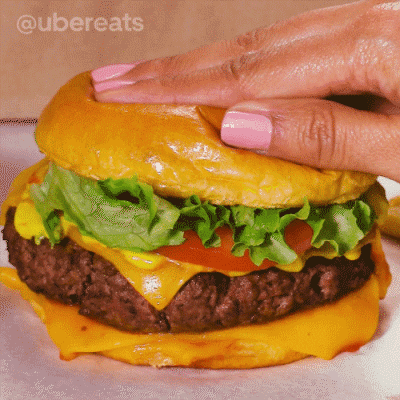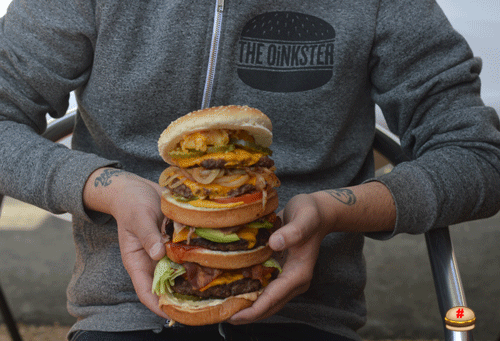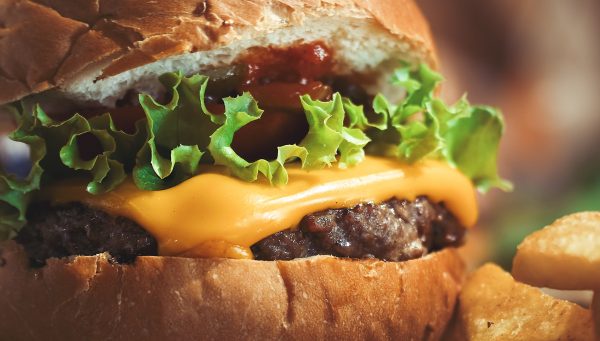Ah, burgers. They’re a staple of the American diet. Those thick patties piled high with lettuce, tomato, pickles, ketchup, mustard, and anything else you can think of, stuffed between two plush buns, are the stuff of our food fantasies. Nothing hits the spot quite like a juicy burger.
But times, they are a-changin’. And so is the burger industry. While beef used to be the only option for a burger patty, followed by turkey and black bean options, now there are plant-based and meatless alternatives, like Impossible Burger and Beyond Burger, that boast similar burger craving-crushing qualities to beef, plus health and environmental benefits.
Does this mean our double-fisting days of cow meat are going by the wayside? Are plant-based burgers really all they’re cracked up to be? We delved into the culinary, nutritional, and environmental factors of both beef and plant-based burgers to answer the question, “Which burger is best?” for this edition of Mandatory Food Fight. What we concluded might surprise you…
Cover Photo: Enes Evren (Getty Images)
COVID Cravings: 10 Weird Foods You’re Suddenly Into (And What Science Has to Say About It)
Ranked: The Worst Foods to Eat Before You Bone
Which burger is best? That depends. If you’re going for pure mouthfeel and flavor, either burger will hit the spot (though we’re still leaning towards beef). If you’re trying to make a burger part of your healthy meal plan, 1) you’re barking up the wrong tree (burgers of any kind aren’t exactly a go-to health food) and 2) you should probably stick with beef, which has fewer processed ingredients and more naturally-occurring nutrients. But if your main concern is protecting the planet, plant-based burgers made from pea protein are the only way to go.
Overall Winner: Beef
Visit the Mandatory Shop for great deals on your very own Mandatory merch.
Follow Mandatory on Facebook, Twitter, and Instagram.
Burger Battle
-
Taste

Beef burgers taste like, well, cooked cow. Plant-based burgers try to mimic the flavor, but eaters can generally tell them apart from the beef burgers in blind taste tests. That’s not necessarily a bad thing, just different. Whether you prefer the flavor of a beef or a plant-based burger might just depend on your mood.
Winner: Tie
-
Texture

Meat eaters and vegetarians alike say that beef and plant-based burgers are surprisingly similar in texture. Both types of burgers are juicy, grill well, and have a meaty mouthfeel. The Beyond Burger is even engineered to “bleed” like a beef burger, thanks to the addition of beet juice. But we gotta say, when push comes to shove, it’s the cow meat (with real blood) we want in our mouths.
Winner: Beef
-
Cost

You’d think that a plant-based burger would be cheaper than beef (whose price just seems to keep rising and rising). After all, plant-based burgers are made from vegetables or beans or other non-meat ingredients. They should be less expensive, right? Wrong. Depending on where you live and how lean your beef is, you’re looking at about $6 for four 4-ounce ground-beef patties. Impossible Burgers and Beyond Burgers retail closer to $5 or $5.50 for two 4-four patties. In other words, plant-based burgers are almost twice as expensive as beef.
Winner: Beef
-
Availability

Beef burgers are everywhere. You could probably find one within a mile of wherever you are right now (if not closer). Plant-based burgers used to be a niche product. You used to have to hit up a vegetarian restaurant, go to a co-op, or live in California to find one. Now, products like Impossible Burger and Beyond Burger are ubiquitous in all kinds of grocery stores. Even fast-food restaurants have gotten on the plant-based burger bandwagon, offering their versions of the meatless patties. While plant-based burgers are on the rise, however, they still aren’t as readily available as beef burgers are.
Winner: Beef
-
Ingredients

You hear so much bad buzz about the meat industry, but when it comes to burgers, beef actually has fewer ingredients overall, and fewer foreign ones than plant-based burgers (especially if you go for organic, grass-fed beef). Here’s a list of some of the eyebrow-raising additions plant-based burgers might contain: pea protein isolate, expeller-pressed canola oil, refined coconut oil, sunflower oil, soy protein, rice protein, cocoa butter, mung bean protein, methylcellulose, potato starch, apple extract, salt, potassium chloride, vinegar, lemon juice concentrate, sunflower lecithin, pomegranate fruit powder, beet juice extract, and unspecified “natural flavors.” That’s a lotta non-botanical gunk for something marketed as “plant-based.”
Winner: Beef
-
Protein

Both beef and cow burgers are excellent sources of protein, clocking in around 20 grams or so per 4-ounce patty. No matter which option you pick, you’re going to get that essential muscle-building power in either burger.
Winner: Tie
-
Sodium

You can’t take the beef out of a burger without making up for the taste somewhere else. That’s where salt comes in, and holy moly, do plant-based burgers have a ton of it – as much as eight times the sodium of a beef burger the same size. Too much salt in your diet is bad news on so many levels, from an increased risk of stroke and heart failure to higher rates of osteoporosis, stomach cancer, and kidney disease.
Winner: Beef
-
Fat

Beef has a huge advantage here in that you can choose how lean you want your burger. You can go as low as 96/4, which offers up about 4.5 grams of fat per 4-ounce patty. Plant-based burgers, however, operate on a one-size-fits-all model, so you’re stuck with whatever fat content they offer, which hovers around 14 to 18 grams of fat per 4-ounce patty, depending on the brand.
Winner: Beef
-
Nutrients

Beef burgers are good sources of vitamins B6 and B12 as well as iron. As it turns out, plant-based burgers are big on all those nutrients, too, and often offer more of all of them than beef burgers. The one disadvantage of plant-based burgers is those nutrients are fortified (read: fake) rather than naturally occurring, as in beef.
Winner: Beef
-
Environmental Impact

It’s no secret that beef production is bad for the planet. It requires a ton of water and land resources that only worsen climate change. Plant-based burgers have a much smaller environmental impact, with one big exception: those that rely on soy protein. That’s because toxic chemicals are used to extract protein from soy, which contributes to air pollution and puts factory workers’ health at risk. Plant-based burgers made from pea protein are the greener option here.
Winner: Plant-Based









